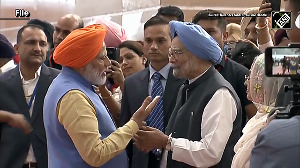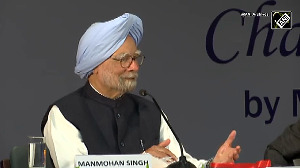 Have you applied for the shares in an Initial Public Offer (IPO) lately? Did you observe the statement that claims, 'The company plans to raise Rs 3,600 crore (Rs 36 billion) through book building method'?
Are you aware what book building is all about? No? Then, read on to know more about this new method of determining the share price of a company during IPO.
Have you applied for the shares in an Initial Public Offer (IPO) lately? Did you observe the statement that claims, 'The company plans to raise Rs 3,600 crore (Rs 36 billion) through book building method'?
Are you aware what book building is all about? No? Then, read on to know more about this new method of determining the share price of a company during IPO.
What is book building?
When companies are on the look out to raise money for their business operations, they use various means for the same.
Two of the most popular means to raise money are Initial Public Offer (IPO) and Follow on Public Offer (FPO).
During the IPO or FPO, the company offers its shares to the public either at fixed price or offers a price range, so that the investors can decide on the right price. The method of offering shares by providing a price range is called as book building method.
Book building
Book building is actually a price discovery method. In this method, the company doesn't fix up a particular price for the shares, but instead gives a price range, e.g. Rs 80-100.
When bidding for the shares, investors have to decide at which price they would like to bid for the shares, for e.g. Rs 80, Rs 90 or Rs 100. They can bid for the shares at any price within this range.
Based on the demand and supply of the shares, the final price is fixed. The lowest price (Rs 80) is known as the floor price and the highest price (Rs 100) is known as cap price.
The price at which the shares are allotted is known as cut off price. The entire process begins with the selection of the lead manager, an investment banker whose job is to bring the issue to the public.
Both the lead manager and the issuing company fix the price range and the issue size. Next syndicate members are hired to obtain bids from the investors. Normally the issue is kept open for 5 days.
Once the offer period is over, the lead manager and issuing company fix the price at which the shares are sold to the investors. If the issue price is less than the cap price, the investors who bid at the cap price will get a refund and those who bid at the floor price will end up paying the additional money.
For e.g if the cut off in the above example is fixed at Rs 90, those who bid at Rs 80, will have to pay Rs 10 per share and those who bid at Rs 100, will end up getting the refund of Rs 10 per share. Once each investor pays the actual issue price, the shares are allotted.
Book building vs fixed price
The main difference between the book building method and the fixed price method is that in the former, the issue price is not decided initially.
The investors have to bid for the shares within the price range given and based on the demand and supply of the shares, the issue price is fixed. On the other hand, in the fixed price method, the price is decided right at the start.
Investors cannot choose the price, but must buy the shares at the price decided by the company. In the book building method, the demand is known every day during the offer period, but in fixed method, the demand is known only once the issue closes.
Book building vs. Reverse book building
While book building is used to raise capital for the company's business operations, reverse book building is used for buyback of shares from the market. Reverse book building is also a price discovery method, in which the bids are taken from the current investors and the final price is decided on the last day of the offer. Normally the price fixed in reverse book building exceeds the market price.
Book building is the price discovery method in which the investors bid for the shares of the company during IPO/FPO. They are given a price range in which the investors have to bid for the shares.
Depending on the demand and supply of the shares, the issue price is fixed. Those who bid at the price higher than the issue price end up getting refund and those who bid at the price below the issue price end up paying the remaining amount.






 © 2024 Rediff.com -
© 2024 Rediff.com -